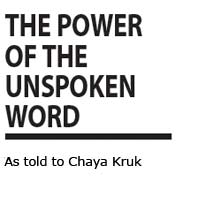
It was erev Shabbos and the suits of
two of my sons were at the cleaners. My husband was going out so I asked him to please pick them up. Knowing that he had a lot on his mind, I reminded him two or three times before he left.
A half an hour before Shabbos, my kids were getting ready. “Tatti, did you pick up my suit?”
“Uh-oh! I forgot to go to the cleaners.” In my frustration, I was ready to say, “That’s why I kept reminding you, so you wouldn’t forget! Now they have nothing to wear for Shabbos!” But I held myself back and didn’t let the words escape.
The older son said, “Now I don’t have anything to wear! I guess I can’t go to shul.” Churning inside, I simply answered, “Gam zu letova – this too is for the good!” How I wanted to rebuke my husband, but what would I gain? Nothing could be done to get the suits in time for Shabbos. Later that evening, when the kids were asleep, I thought I would bring the matter up, but I decided that, if I could hold my tongue before, I could do it again. And once again, I held myself back from mentioning it. This may sound simple to you, but for me it was a tremendous victory!
I remember reading in Rabbi Ezriel Tauber’s book, As in Heaven So on Earth, about the power of a private kiddush Hashem. (This includes any act of self-restraint, where only Hashem knows what you wanted to say or do but held yourself back.) Just as the light in our home is generated by an unseen and distant power plant, so, too, our private kiddush Hashem generates a ko’ach that lights up the world of other Jews and helps them in some way. I imagined the positive energy the deed of holding my tongue generated, which was being put to use to light up someone’s world. I imagined how proud my Father in Heaven must be. I even imagined the malachim (angels) clapping for me!
The next day, my younger son asked, “Isn’t it true we’re not supposed to wait until the last minute to do things?” My husband said “Oh, you mean the dry cleaning…?” My son didn’t even hear him and continued with his thought. “Then how come Mashiach is waiting until the last minute to come?” The suit wasn’t on his mind at all. I am sure that, because I didn’t make a big deal about it, as I would have in the past, the boys didn’t let it bother them.
I often look at others, seeing how much chesed they do, how involved they are in community affairs, how they seem to have time to do so much for others. And I would berate myself as a do-nothing person. True, I change diapers, do dishes and laundry, make meals, drive carpools, etc., but those ladies do that plus more. Now I see that I can do chesed; I can help the world just by holding back negative words, as I’ve learned, “Tolah ha’aretz al blima.” (Iyov 26:7). Literally, this means that Hashem suspends the world on nothingness. But Chazal explain it in another way: that the world exists in the merit of those who stop their mouths, or are quiet, at a time of machlokes (argument).
What greater chesed can there be than holding up the world! Never underestimate the power of the unspoken word. Be’ezras Hashem, with a little restraint at the right time, Mashiach won’t have to wait until the last minute!â—†
Future articles will deal with changing our negative thought patterns. Mrs.Chaya Kruk gives classes on interpersonal relationships on Sunday mornings at WIT, Monday evenings (9:15) in her home, and Shabbos afternoon (3:30) at Agudah of Park Heights.






